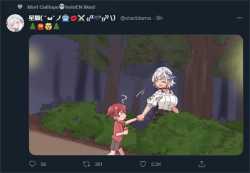>>9844533I've thought about this, and I still don't have a conclusive answer, but from observing some arguments I can make a few suppositions:
One of the most obvious beliefs is that lolicon normalizes the sexualization of children and is only consumed by pedophiles. This would be true if not for the fact that it has been proved that fiction containing "problematic" elements only affects people case by case, meaning normal minds aren't usually affected by this kind of content.
I should also mention, lolis look different enough from actual children just by having an anime/cartoon artstyle; most will bring the fact that "you're still fantasizing about having sexual relationships with a child" but this is wrong and ignores the nuance of separating fiction from reality.
Take a look at this psychologist and how he explains that it's perfectly normal to have such fantasies and that it isn't indicative of dangerous behavior unless those thoughts start escalating.
>https://files.catbox.moe/z1npv6.mp4In fact, having taboo fantasies can be healthy, to the point some CSA survivors will use lolicon/shotacon as a coping mechanism and their therapists will allow it.
Continuing with the original point, there's also people who have had bad experiences in the past, and lolicon reminds them of such experiences. Some stories I've heard are: people sexually abused in their childhood making them feel repulsed by lolis; people that have been at conventions and encountered creeps; or even those who claim being groomed by lolicon(s), online and/or IRL.
Note that these stories come from times where supervision and safety rules weren't enforced enough, you'll have people claiming they were "traumatized" by founding Pokémon porn in a Google search, and you'll probably think "why don't they use filters?". It's also the fact that many will put blame in the content itself and not the creeps who hurt them.
Another point is that lolis and shotas have been part of Otaku Culture in Japan since its very beginning, and then compare it to the arrival of anime in the U.S. and similar countries. It's also important to bring up the fact that Americans have an incredibly negative view of pedophilia to the point your reputation could be ruined forever even if you have never committed a crime against minors. Combine this point with lolis being seen as pedobait.
Let me mention, yes, there are lolicons who are pedophiles, but putting everyone in the same bag and not understanding what is pedophilia or its impact it's very counterproductive in protecting children.
tl;dr: People feel disgusted by lolicon and associate it with problematic IRL behavior, so they have an immediate and kind of irrational reaction towards it, because of moral panic and poor understanding of why it exists in the first place.

